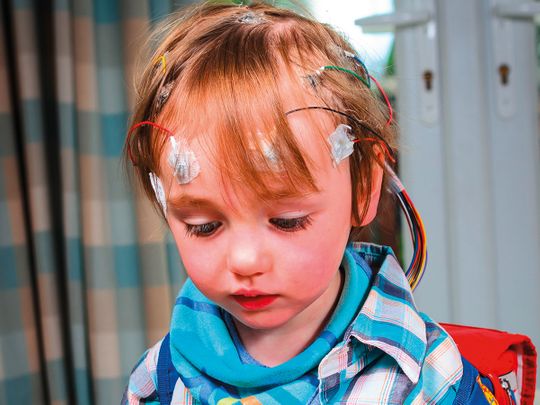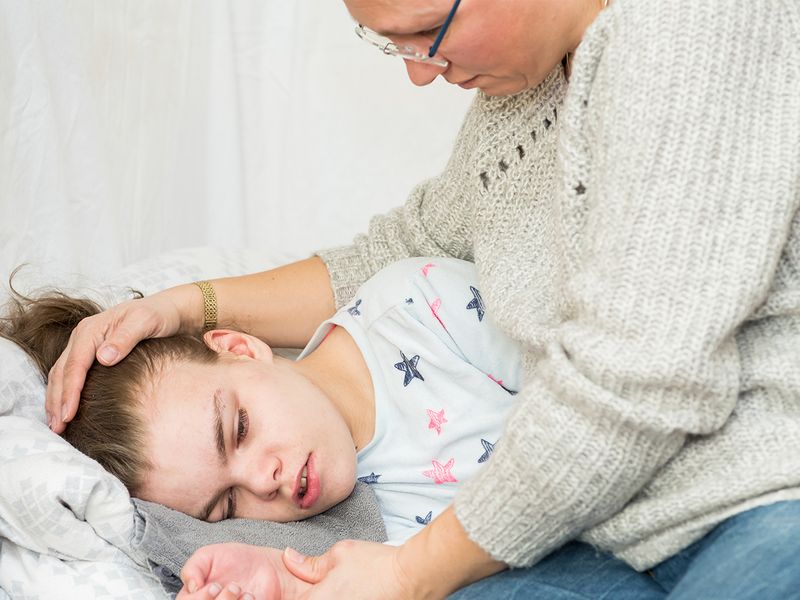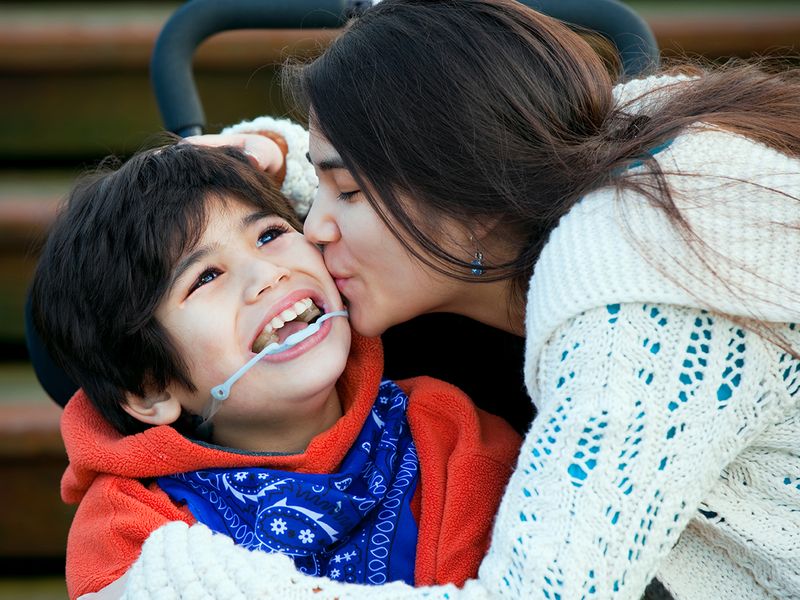

Parents wish for their children to grow up healthily. However, if the child is struggling to meet their developmental milestones or showing some signs of decline, then it is a warning of some neurological disorder.
This may be a condition where there is dysfunction in the brain, nervous system or muscle cells, leading to disorders such as epilepsy, headaches and movement disorders. Here are some guidelines for seeking paediatric support.
Epilepsy

A seizure is a sudden, uncontrolled electrical disturbance in the brain. Still, a single seizure is not epilepsy — it’s usually more than one seizure, explains Dr Anuradha Ajesh, Specialist — Paediatrics at Bareen International Hospital, MBZ City.
Epileptic seizures can occur due to external factors that may affect the brain, such as fever, lack of oxygen, low levels of blood sugar and excessive intake of alcohol, but these cannot be classified as epilepsy, she says.
Avoid saying things that could make your child feel like a burden and praise their success. Make time for yourself and build a support network for you and your child.
– Dr Anuradha Ajesh, Specialist — Paediatrics at Bareen International Hospital, MBZ City
Epilepsy can be idiopathic where hereditary factors are a reason, and here, medication to control seizures usually works very well.
“Or it’s symptomatic epilepsy, wherein an underlying brain condition or brain damage causes epilepsy,” she adds. “Some conditions are present at birth, while some develop later in life, such as a patch of scar tissue in a part of the brain, head injury or stroke.”
Warning signs These include sensitivity to smells, sounds or sights, anxiety, nausea, dizziness, and vision problems such as tunnel vision and staring spells, says Dr Ajesh.
Action plan If a child has had a possible seizure or similar event, Dr Ajesh advises taking them to a doctor and describing the event. “Epilepsy cannot be cured with medication. However, with the right type and strength of medication, the majority of cases do not have seizures, but medication should be taken daily.”
Parents’ role Dr Ajesh advises discussing the condition honestly with the child and helping the child talk honestly with others about epilepsy. “Avoid saying things that could make your child feel like a burden and praise their success. Make time for yourself and build a support network for you and your child.”
Cerebral palsy

This is a lifelong condition that affects movement and coordination. “It is usually caused by a problem with the immature brain that occurs before, during or soon after birth,” explains Dr Sathiya Jayapal, Consultant Paediatrician at American Hospital Dubai. “The symptoms vary from mild to severe.
“The risk is high if the baby is born very premature or was born in poor condition at birth leading to lack of adequate oxygen supply to the brain, structural abnormalities of the brain, genetic and other rare causes.”
Warning signs “These are delays in reaching developmental milestones (unable to sit without support by eight months of age or walk independently by 18 months), difficulties with fine motor skills (picking up and transferring objects), walking clumsily, excessive drooling, swallowing difficulties, and poor communication skills, among others.”
The risk is high if the baby is born very premature or was born in poor condition at birth leading to lack of adequate oxygen supply to the brain, structural abnormalities of the brain, genetic and other rare causes.
– Dr Sathiya Jayapal, Consultant Paediatrician at American Hospital Dubai
Action plan Although there is no curative treatment, early initiation of therapy and regular input from various professionals can help the child to optimise their ability to function better, explains Dr Jayapal.
Parents’ role If it is diagnosis, work closely with all the professionals involved in your child’s care. “Help the child to integrate with school, which suits their needs, and work along with experienced teachers to maximise the potential of your child,” he says.
Autism

This is a lifelong condition where children struggle to communicate as well as perceive others effectively. Dr Vivek Mundada, Consultant Paediatric Neurology, Aster Hospital, Al Qusais, explains: “The children can struggle to interpret verbal as well as non-verbal communication and often struggle to understand any conversation with sarcasm or humour-like contents.
“Things are often black and white for them and hence social interaction with others is a big issue. Autism can be an isolated condition or even part of any syndrome — like in Down’s syndrome or tuberous sclerosis.”
Things are often black and white for them and hence social interaction with others is a big issue. Autism can be an isolated condition or even part of any syndrome — like in Down’s syndrome or tuberous sclerosis.
– Dr Vivek Mundada, Consultant Paediatric Neurology, Aster Hospital, Al Qusais
Warning signs The signs include speech delay (use of only single words by two years of age); delayed or absent response to being called despite normal hearing; lack of proper two-way communication; and inability to recognise other’s feelings or facial expressions.
Action plan Get information from the child’s nursery or preschool to find out if their teachers or other caretakers have similar concerns. And seek help of a child neurologist to learn about the condition and child management plan, he adds.
Parents’ role Although, parents are often the first ones to identify any such concerns with their child, Dr Mundada says sometimes it can be difficult to pick up any warning signs. “So, if you are seeing any paediatricians even for vaccines or for general check-ups, discuss your child’s development with them. An early and accurate diagnosis helps in identifying the child’s strengths and difficulties, giving them appropriate care and management,” he adds.
Headaches

Dr Mundada says headaches are of many different types, classified as primary and secondary. “A secondary headache is because of other problems such as sinusitis, tooth issue and head injury. Primary headaches do not have any causative problem and are diagnosed based on the character and nature of the pain. Migraines and tension-type headaches are the most common types of primary headaches.”
Warning signs Take note of any headaches that wake a child from sleep or are worsening in character, as well as associated symptoms such as vomiting, change in the child’s personality, vision or any other eye problem, stiffness in the neck, fever and change in pain with position, says Dr Mundada.
A secondary headache is because of other problems such as sinusitis, tooth issue and head injury. Primary headaches do not have any causative problem and are diagnosed based on the character and nature of the pain
– Dr Vivek Mundada, Consultant Paediatric Neurology, Aster Hospital, Al Qusais
Action plan Secondary headaches are rare in children, and primary headaches and tension-type headaches are commoners than migraines, he says. “The diagnosis of such headaches depends on the character of the pain, and sometimes it becomes difficult to diagnose the type accurately in a single visit because of the child’s inability to explain his pain.”
Parents’ role He adds that the doctor may issue a headache diary to get more information such as triggers for the headaches significant event or change in the child’s life and more. “Apps like Migraine Buddy are also useful in gathering such information. Also, getinformation from the child’s school of any underlying issues such as anxiety or bullying that may trigger headaches.”
ADHD

A child with attention deficit hyperactivity disorder (ADHD) has differences in brain development and activity, which affect attention, the ability to sit still and self-control. Dr Hussein Nasser Matlik, Consultant — Paediatric Neurology and Head of Department, Burjeel Hospital Abu Dhabi, says, “It often begins in childhood and causes a child to have trouble in school, at home or with friends. It’s more common in boys than in girls.”
Warning signs ADHD makes it hard for them to sit still, pay attention or make good decisions. “Symptoms are hyperactivity, impulsivity and inattention. These affect the child’s cognitive, academic, behavioural, emotional and social functioning.”
A doctor can make a diagnosis of ADHD only if a child’s symptoms are seen in more than one place, like at home and in school, last at least six months, start before age 12 and affect his friendships or schoolwork.
– Dr Hussein Nasser Matlik, Consultant — Paediatric Neurology and Head of Department, Burjeel Hospital Abu Dhabi
Action plan Talk to your child’s doctor about their symptoms and behaviour at home and school. “A doctor can make a diagnosis of ADHD only if a child’s symptoms are seen in more than one place, like at home and in school, last at least six months, start before age 12 and affect his friendships or schoolwork,” adds Dr Matlik.
Parents’ role Education of patients, families and teachers regarding the diagnosis is an integral part of treatment. “Management centres on the achievement of target outcomes and must be chosen in collaboration with the child, parents and school personnel,” he says.